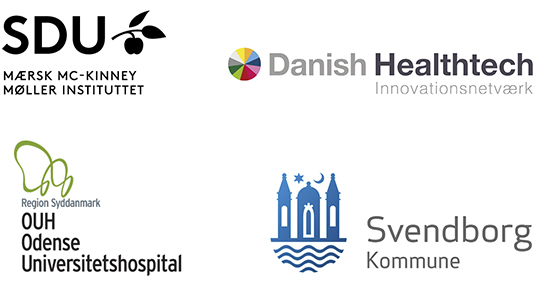Inequality in health in childhood affects both physical and mental health later in life. Pregnancy and especially the first two years of the baby's life is a crucial period that determines the child's healthy development and life opportunities. Large differences in the child's environment thus creates an important foundation for both social differences in morbidity later in life and for negative social heritage.
A study shows that 30% of Danish healthy-born children are admitted at a hospital before they reach the age of 15 months, and one fifth of these children are admitted to "observation". This means that children are sent home from the hospital without a diagnosis. Children of vulnerable families have an increased risk of being hospitalized, so it is important to focus on this target group and their challenges if admissions among 0-2-year-olds are to be prevented. It is an intense experience for both children and parents when children are admitted, and the experience can leave traces into adult life. At the same time, the health care professionals are running very fast at the hospitals, and there is not enough capacity and beds. Furthermore, the municipality has a large share of co-financing when children under the age of two are admitted. There is therefore a broad interest in preventing hospitalization of children.
At SDU Health Informatics and Technology, we are working on an innovation project that deals with how technology can prevent admissions for 0-2-year-old children of vulnerable families.
The project is carried out in collaboration with Svendborg Municipality and OUH.
When using systematic innovation, the project, in cooperation with citizens and public and private actors, will transform idea generation and idea development into specific solutions that can be developed, tested in relevant environments and possibly implemented in collaboration with OUH and Svendborg Municipality.
The project is a collaboration with the OUH and Svendborg Municipality within the framework of eHealth City Svendborg.
A study shows that 30% of Danish healthy-born children are admitted at a hospital before they reach the age of 15 months, and one fifth of these children are admitted to "observation". This means that children are sent home from the hospital without a diagnosis. Children of vulnerable families have an increased risk of being hospitalized, so it is important to focus on this target group and their challenges if admissions among 0-2-year-olds are to be prevented. It is an intense experience for both children and parents when children are admitted, and the experience can leave traces into adult life. At the same time, the health care professionals are running very fast at the hospitals, and there is not enough capacity and beds. Furthermore, the municipality has a large share of co-financing when children under the age of two are admitted. There is therefore a broad interest in preventing hospitalization of children.
At SDU Health Informatics and Technology, we are working on an innovation project that deals with how technology can prevent admissions for 0-2-year-old children of vulnerable families.
The project is carried out in collaboration with Svendborg Municipality and OUH.
The purpose of the project
The project is built around the problem; children of vulnerable families are admitted more often than children of non-vulnerable families. The focus is on identifying how technology can prevent admissions of 0-2-year-old children from vulnerable families.Project outcome
Successful technology is based on real needs and is rooted in the organization.When using systematic innovation, the project, in cooperation with citizens and public and private actors, will transform idea generation and idea development into specific solutions that can be developed, tested in relevant environments and possibly implemented in collaboration with OUH and Svendborg Municipality.
Collaborators
The project is an innovation project financed by the innovation network Danish Healthtech. Danish Healthtech is a national innovation network that aims to strengthen national cooperation on development and testing of health and welfare technology and to promote cooperation between private companies, municipalities, hospitals, and universities across the country. The University of Southern Denmark is one of a total of 11 partners in the network.The project is a collaboration with the OUH and Svendborg Municipality within the framework of eHealth City Svendborg.
Contact
Project coordinator: Camilla Panduro Nielsen, SDU Health Informatics and Technology, Mærsk Mc-Kinney Møller Institute.


